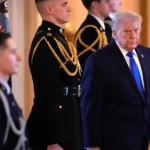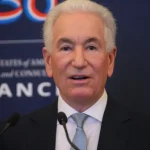
President Joe Biden has returned from a trip to the Middle East, where he met with leaders from Israel and Arab nations.
The trip was a mix of damage control for the U.S.-Arab relationships as well as a step in dealing with the looming threat from Iran.
This was Biden’s first trip to the region. Relationships, particularly with Saudi Arabia, have not been smooth under his presidency and many have criticized Biden’s adminsitration of neglecting the region.
Aaron David Miller, a senior fellow at the Carnegie Endowment for International Peace, and Daniel C. Kurtzer, a former U.S. ambassador to Egypt and Israel, likened the situation to someone leaving a garden untended for many months, in an article for Foreign Policy. “Having deprioritized the Middle East for 16 months, the weeds grew,” the two experts wrote.
But the accomplishments of Biden’s trip were not monumental, James Phillips, a Senior Research Fellow for Middle Eastern Affairs at The Heritage Foundation, told the Western Journal.
“I think President Biden returned from his trip with many photographic souvenirs, but no major accomplishments,” Phillips said. “In fact, much of the trip really was an exercise in repairing damaged ties to long-term Arab partners in which the president was forced to repudiate many of his own policies.”
The relationship with Saudi Arabia was of key importance to this trip, since Biden had previously alienated the Arab kingdom with his condemnation of Crown Prince Mohammed bin Salman after the killing of Saudi dissident and journalist Jamal Khashoggi.
During his campaign for the presidency, Biden declared that he would treat the crown prince (who is now the de facto ruler of the kingdom) as a “pariah” for human rights abuses.
Do you think Biden has ruined the US presence on the international stage?
Yes: 100% (12 Votes)
No: 0% (0 Votes)
Biden previously said his plan was to make the Saudis “pay the price, and make them in fact the pariah that they are.” He added that there is “very little social redeeming value in the present government in Saudi Arabia,” the New York Times reported.
This obviously damaged U.S. relations with the kingdom, but Saudi Arabia is key to stability in the Middle East. So Biden’s trip to the Middle East was necessary, as was his meeting with bin Salman.
“And as unsavory as it was to fist-bump with an authoritarian leader, I think that was something the president should have done, because Saudi Arabia, for eight decades, has been an important partner on security issues and especially on energy issues,” Phillips said. “And as president, I think Joe Biden couldn’t afford to neglect American interests in order to virtue-signal to the left wing of the Democratic Party on the crown prince.”
But beyond just repairing the relationship with Saudi Arabia and firming up relationships with leaders in Israel, the Biden administration should have been focusing on using these ties to counteract the threat of Iran, Phillips said.
“Well, I think the focus of the entire trip should have been on the rising threat coming from Iran,” Phillips noted.
Iran is, and has for some time, been an immediate threat, in ways that China and Russia are not.
Phillips noted that the Biden administration has been focused on the threat of China and Russia, and while those may be the greater and more long-term threats, Iran is a very immediate and aggressive threat to the U.S.
“Iran right now is sending drones to attack U.S. troops in Iraq and Syria. There are 70,000 Americans in Saudi Arabia that have been targeted by Iranian drones, launched by the Houthi rebels in Yemen that Iran has heavily armed. Americans have suffered from terrorism, from Hezbollah and other Iranian proxy groups. So, I think it would be a mistake to think that the U.S. can just pivot in a carefree manner to confront China when the job has not been finished with Iran,” Phillips said.
The Biden administration needs to be taking more aggressive steps to handle Iran and cannot just keep pursuing soft diplomacy and the stalled nuclear deal talks with a country that is aggressively trying to undermine stability, target Americans and produce nuclear weapons.
Phillips said that he believes cranking up the economic pressure on Iran is absolutely necessary, especially since Iran is in bed with Russia and China, the U.S.’s other opponents.
“The U.S. has to put on much more economic pressure not only against Iran, but against Chinese oil companies that are Iran’s biggest customers. The administration has slowly turned up the heat, but it still is not fully enforcing U.S. sanctions against Iran. And that is a huge mistake, because it’s kind of diplomatic malpractice,” Phillips said.
But beyond just upping economic pressure on Iran, the U.S. also could play a key middleman role in creating a sort of coalition against Iran.
While Israel and the Arab states do not have great relationships (if any at all), their common enemy is Iran.
“The primary focus of this trip should have been trying to expand cooperation between Israel and Saudi Arabia and other Arab countries to resist Iran’s proxy attacks and prepare for the possibility of a nuclear Iran,” Phillips said.
Unfortunately, Biden’s trip to the Middle East didn’t seem to make it that far in accomplishing any sort of relationships or steps in defending against Iran’s aggression.
This has made Biden an untrustworthy ally for many Middle Eastern states.
As of now, the president’s policies leave the door wide open for continued Iranian aggression and could also push the Arab nations further into the arms of Russia and China.
“I think that these [Middle Eastern] powers can’t afford to alienate those great powers at a time when they don’t fully trust President Biden,” Phillips said. “And so they’re in no hurry to alienate Russia or China until they’re sure they can trust the Biden administration.”






